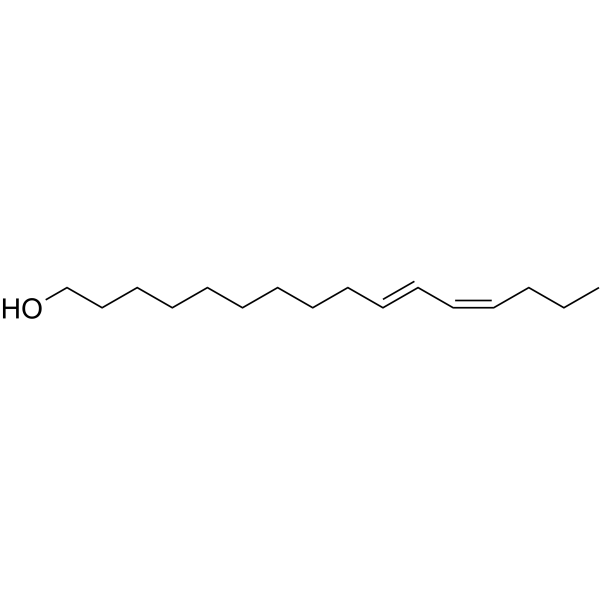
Bombykol
CAS No. 765-17-3
Bombykol( Isobombycol | (10E,12Z)-hexadeca-10,12-dien-1-ol | 10E,12Z-hexadecadien-1-ol | Hexadeca-10E,12Z-dien-1-ol )
Catalog No. M28337 CAS No. 765-17-3
Bombykol is an insect sex pheromone that is produced as a sex attractant for the females of Bombyx mori.
Purity : >98% (HPLC)
 COA
COA
 Datasheet
Datasheet
 HNMR
HNMR
 HPLC
HPLC
 MSDS
MSDS
 Handing Instructions
Handing Instructions
| Size | Price / USD | Stock | Quantity |
| 5MG | 46 | Get Quote |


|
| 100MG | Get Quote | Get Quote |


|
| 200MG | Get Quote | Get Quote |


|
| 500MG | Get Quote | Get Quote |


|
| 1G | Get Quote | Get Quote |


|
Biological Information
-
Product NameBombykol
-
NoteResearch use only, not for human use.
-
Brief DescriptionBombykol is an insect sex pheromone that is produced as a sex attractant for the females of Bombyx mori.
-
DescriptionBombykol is an insect sex pheromone that is produced as a sex attractant for the females of Bombyx mori.
-
In Vitro——
-
In Vivo——
-
SynonymsIsobombycol | (10E,12Z)-hexadeca-10,12-dien-1-ol | 10E,12Z-hexadecadien-1-ol | Hexadeca-10E,12Z-dien-1-ol
-
PathwayOthers
-
TargetOther Targets
-
RecptorSIRT5
-
Research Area——
-
Indication——
Chemical Information
-
CAS Number765-17-3
-
Formula Weight238.41
-
Molecular FormulaC16H30O
-
Purity>98% (HPLC)
-
SolubilityIn Vitro:?DMSO : 100 mg/mL (419.45 mM)
-
SMILES——
-
Chemical Name——
Shipping & Storage Information
-
Storage(-20℃)
-
ShippingWith Ice Pack
-
Stability≥ 2 years
Reference
1.Li M , Melnick A M . Non-oncogene Addiction to SIRT5 in Acute Myeloid Leukemia[J]. American Association for Cancer Research Journals, 2021(3).
molnova catalog



related products
-
2'-Rhamnoechinacosid...
2'-Rhamnoechinacoside is a natural product from Cistanche tubulosa.
-
Alendronate sodium h...
Alendronate sodium hydrate (Alendronate;MK 217;G-704650 Adronat) is a bisphosphonate that acts as a specific inhibitor of osteoclastmediated bone resorption.
-
zerumbone
Zerumbone is a natural monocyclic sesquiterpene first isolated from rhizomes of the wild ginger Z. zerumbet.It has also been shown to have anti-oxidant and anti-inflammatory activities contributing to immunomodulatory and hepatoprotective effects.



 Cart
Cart
 sales@molnova.com
sales@molnova.com


